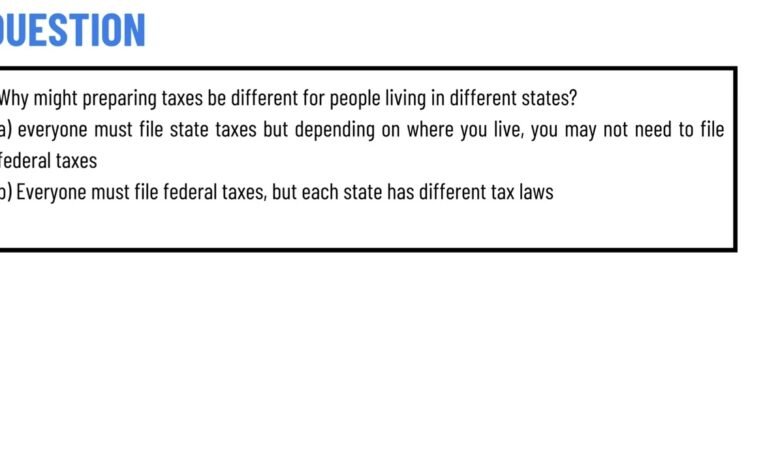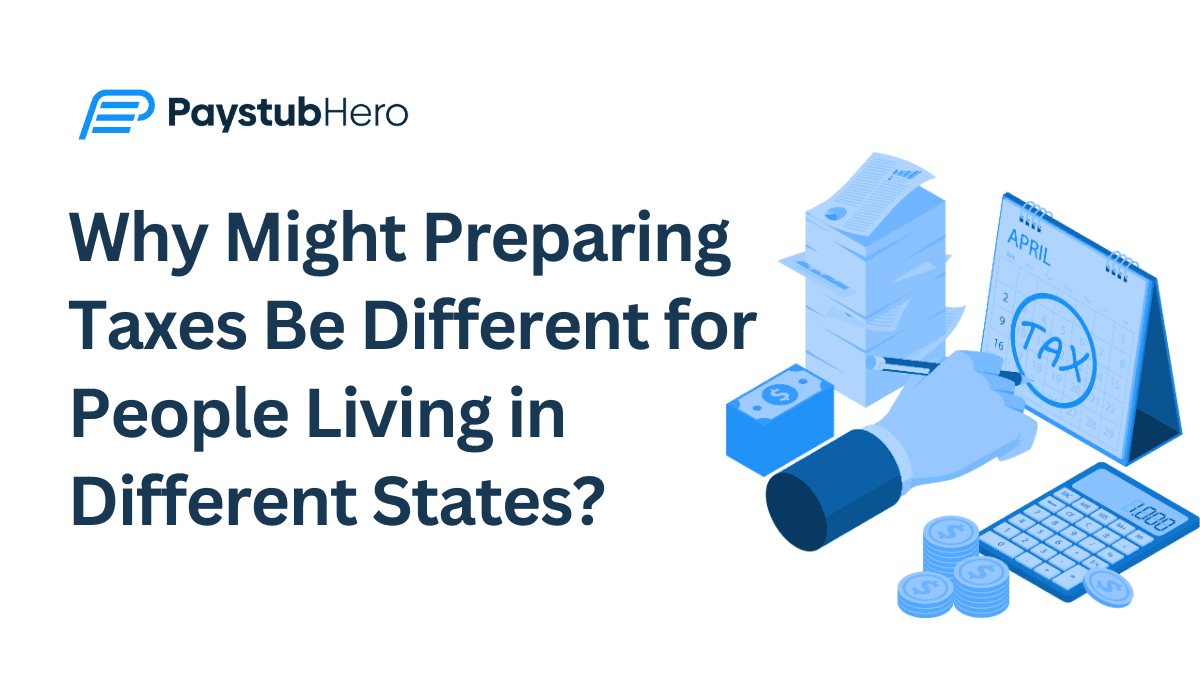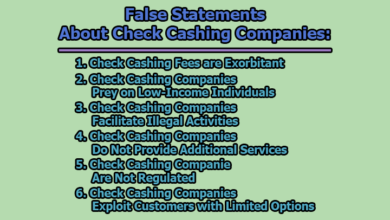Why Might Preparing Taxes Be Different For People Living In Different States?

Tax preparation varies for people living in different states. States have unique tax laws and regulations.
This affects how residents file their taxes. Understanding state-specific tax differences is essential for accurate filing. Each state has its own tax rates, deductions, and credits. These differences can impact your tax return significantly. Some states have no income tax, while others have high rates.
Property taxes, sales taxes, and local taxes also play a role. Knowing the specific requirements of your state can save you time and money. It can also help you avoid penalties. Staying informed about these differences ensures you file correctly and take advantage of all available benefits.
Credit: www.gauthmath.com
State Tax Laws
Preparing taxes can be a complex task. State tax laws add another layer of complexity. Each state has its own tax regulations. This means that the rules can vary widely. Understanding these differences is crucial for accurate tax filing.
Income Tax Variations
Each state handles income tax differently. Some states have a flat tax rate. Others use a progressive tax system. There are also states with no income tax. This can affect your take-home pay and tax filing process.
Here is a brief overview of state income tax types:
- Flat Tax States: Everyone pays the same rate.
- Progressive Tax States: Rates increase with income.
- No Income Tax States: No state income tax is collected.
These variations mean that moving to a new state can change your tax situation significantly.
Sales Tax Differences
Sales tax also varies by state. Some states have high sales tax rates. Others have no sales tax at all. This affects the cost of goods and services. Understanding these differences can help you budget better.
Below is a table showing examples of sales tax rates:
| State | Sales Tax Rate |
|---|---|
| California | 7.25% |
| Oregon | 0% |
| Texas | 6.25% |
Knowing the sales tax rates helps you understand your overall tax burden. It can also influence where you choose to live.
Deductions And Credits
Filing taxes can be a challenging task. This is especially true for those living in different states. Each state has its own rules about deductions and credits. These differences can have a big impact on your tax return. Let’s explore some of these unique aspects in more detail.
State-specific Deductions
Each state offers different deductions that can lower your taxable income. These deductions vary widely. Here are a few examples:
- Property Tax Deductions: Some states allow you to deduct property taxes.
- Health Care Expenses: Certain states offer deductions for medical costs.
- Education Deductions: States like New York offer deductions for tuition fees.
Understanding these state-specific deductions can help you save money. Make sure to check what your state offers.
Unique Tax Credits
Tax credits are even more beneficial than deductions. They directly reduce the amount of tax you owe. Different states offer unique tax credits. Here are some examples:
- Renewable Energy Credits: Some states offer credits for using solar or wind energy.
- Childcare Credits: States like California offer credits for childcare expenses.
- Historic Preservation Credits: Some states reward you for restoring historic buildings.
These credits can significantly reduce your tax burden. They are worth exploring to maximize your savings.
Property Taxes
Property taxes are a significant part of the tax landscape in the United States. They vary greatly depending on the state you live in. Different states use different methods to assess property values and have unique exemption programs. These differences make tax preparation unique for residents of different states. Understanding these differences can help you navigate property taxes more efficiently.
Assessment Methods
States use various methods to assess property values. Some states assess properties annually, while others do it less frequently. The frequency of assessments can affect your property tax bill. Assessments can also be based on market value or a percentage of market value. States may use different criteria to determine the market value. This can lead to significant differences in property taxes across states.
Exemption Programs
Exemption programs can significantly reduce your property tax bill. States offer different exemption programs based on various factors. These may include age, disability status, or military service. Some states offer homestead exemptions, which reduce the taxable value of your primary residence. Understanding the available exemptions in your state can help you save money on property taxes.
Filing Deadlines
Filing taxes can be tricky. Each state has its own rules and deadlines. Knowing these deadlines is vital. Missing them can lead to issues. Different states mean different dates. This can be confusing.
State Filing Dates
Each state sets its own filing date. Some states follow the federal deadline. Others have a different date. This means you need to check your state’s rules. Missing a state deadline can lead to penalties.
Extensions And Penalties
Most states offer extensions. An extension gives you more time to file. But you still need to pay on time. If you don’t, you may face penalties. Penalties can add up quickly. So it’s important to file and pay on time.
State Residency Rules
State residency rules can significantly impact how you prepare your taxes. Each state has its own set of rules to determine residency. These rules can affect your tax obligations. Understanding these rules is essential for accurate tax filing.
Determining Residency
States use various criteria to determine residency. Common factors include the location of your primary home, where you work, and where you spend most of your time. Some states also consider where you are registered to vote. Others look at where your car is registered. Meeting these criteria in a state can establish your residency there.
Implications For Part-year Residents
If you lived in more than one state during the year, you might be a part-year resident. This means you will need to file taxes in each state where you lived. Each state has its own rules for part-year residents. You may need to report income earned in each state separately. This can be complicated and may require careful record-keeping. Understanding the rules for part-year residency can help you avoid errors and penalties.

Credit: www.paystubhero.com
Local Taxes
Local taxes can significantly impact how people prepare their taxes. These taxes are specific to the area where one lives, and they vary widely. Understanding the different types of local taxes is crucial for accurate tax preparation.
City And County Taxes
Many cities and counties impose their own taxes. These taxes can include income, property, and sales taxes. For instance, New York City has its own income tax that residents must pay in addition to state and federal taxes. Similarly, in California, each county can set its own sales tax rate.
Here is a table showing examples of city and county taxes:
| Location | Type of Tax | Rate |
|---|---|---|
| New York City | Income Tax | 3.876% |
| Los Angeles County | Sales Tax | 9.5% |
Special District Levies
Special districts are areas created to provide specific services. These include schools, fire protection, or public transportation. Residents in these districts may pay additional taxes to support these services.
For example, a special district may levy a tax to fund a new school. These taxes are often added to property taxes. They can vary based on the needs of the district.
Here are some common types of special district levies:
- School District Taxes
- Fire Protection District Taxes
- Public Transit District Taxes
Each of these can affect the total tax bill for residents in different states.
Reciprocal Agreements
Reciprocal agreements can make tax preparation different for people in various states. These agreements are deals between two states. They allow residents to only pay income tax in their home state. This can simplify tax filing for some people.
But not everyone benefits from these agreements. It depends on where you live and work. Let’s explore how reciprocal agreements can affect your taxes.
Income Tax Reciprocity
Income tax reciprocity means states agree not to tax each other’s residents. For instance, if you live in State A but work in State B, only State A taxes your income. This can save time and reduce paperwork.
Not all states have these agreements. Check if your state has a reciprocal agreement with the state you work in. It could make a big difference in your tax preparation.
Impact On Commuters
Commuters often cross state lines for work. Reciprocal agreements can ease their tax burden. They only need to file a tax return in their home state. This can avoid double taxation and save money.
Without a reciprocal agreement, you might have to file in both states. This can be confusing and time-consuming. Knowing your state’s agreements helps in planning and preparing taxes efficiently.
Tax Preparation Resources
Tax preparation can be complex. It gets even trickier for people living in different states. Each state has its own tax rules and regulations. Luckily, various tax preparation resources can help. These resources can make the process simpler and less stressful.
State Tax Agencies
Every state has a tax agency. These agencies provide specific information about state taxes. They offer guides and resources tailored to their state’s tax laws. You can find forms, instructions, and contact information on their websites. These resources are invaluable for understanding your state’s tax requirements.
Online Tools And Software
Online tools and software can be a big help. They simplify tax preparation. Many of these tools are user-friendly. They guide you step-by-step through the process. Some software even integrates with federal and state tax agencies. This integration ensures you file taxes accurately for both state and federal levels.
Popular online tax software includes TurboTax, H&R Block, and TaxAct. These tools offer different packages based on your needs. They provide features like error checks and e-filing options. Using these tools can save time and reduce errors.

Credit: www.youtube.com
Frequently Asked Questions
Why Do Tax Laws Vary By State?
Tax laws differ because each state has its own regulations. These include varying income tax rates, deductions, and credits. Understanding state-specific rules is crucial for accurate tax preparation.
Are State Tax Deadlines Different?
Yes, state tax deadlines can differ from federal deadlines. Each state sets its own filing dates. It’s important to check your state’s specific deadlines to avoid penalties.
How Do State Taxes Affect Refunds?
State taxes can impact your overall refund amount. Each state has different tax rates and credits. Knowing your state’s rules can help you maximize your refund.
Do All States Have Income Taxes?
No, not all states impose income taxes. States like Florida and Texas do not have state income taxes. Living in a no-income-tax state can simplify your tax preparation.
Conclusion
Living in different states affects how you prepare taxes. Each state has unique tax laws. Some states have no income tax, while others do. Deductions and credits vary widely. Local taxes can also impact your returns. It’s essential to understand your state’s rules.
This knowledge helps you avoid mistakes. Consider consulting a tax professional. They can guide you through state-specific requirements. Accurate tax preparation saves time and money. Always stay informed about changes in state tax laws. This ensures smooth tax filing each year.



